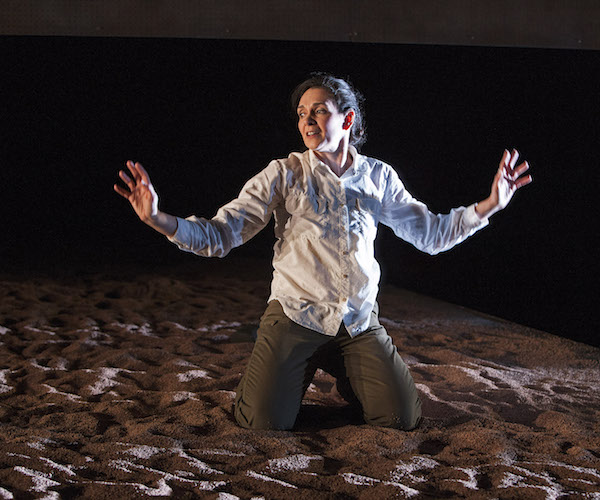Theater Review: “Daughter of a Cuban Revolutionary” — Heartfelt History
Daughter of a Cuban Revolutionary is at its most theatrically gripping when Marissa Chibas is caught up in her memories.
Daughter of a Cuban Revolutionary by Marissa Chibas. Directed by Mira Kingsley. Presented by CalArts Center for New Performance and Duende CalArts at ArtsEmerson’s Jackie Liebergott Black Box Theatre, Boston, MA through May 1.

Marissa Chibas in a scene from “Daughter of a Cuban Revolutionary.” Photo: Miranda Wright.
By Jess Viator
An image of grey-colored ocean water is projected onto a long, narrow screen. The sound of waves crash around us. On stage, Marissa Chibas gasps for breath as she begins her one-woman show, which is dedicated to her family’s exploits as Cuban revolutionaries and then political exiles who had to cross the Florida Strait on a 17-foot catamaran. Chibas tells us that she was on vacation, at one point swimming near a waterfall, when she started to flounder. Suddenly she was overcome by flashbacks to her traumatic childhood experiences. Her opening speech is punctuated with panicked gasps for breath — still, despite her fears, she welcomes the onslaught of the past.
Daughter of a Cuban Revolutionary is at its most theatrically gripping when Chibas is caught up in her memories, imaginatively re-creating the members of her family. When she reverts to becoming a neutral, storytelling character she comes off as a bit of a milquetoast. And she is strangely upbeat, considering the dark tone of the story (and the fact that she is in the process of drowning). But when Chibas portrays her father, Raul, as he is being led off to his execution (he managed to escape) she is captivating, completely transformed — accent, masculine mannerisms, a quiet sense of gallows humor, all spot-on.
Daughter of a Cuban Revolutionary is a history lesson told from a first-person perspective, with each character sharing his or her story with us as if we were an intimate friend. Back and forth through time we go, following Chibas’ memories: Raul tells us how initially he fought with Fidel Castro and then opposed his authoritarian views. He was forced to flee Cuba, fearing for his life. When a younger version of Marissa is in Cuba, we encounter the specter of her uncle Eduardo in the form of an audio recording of his final radio show. A powerful and beloved political figure, the man might have been elected president of the country in 1952 had he not shot himself (while on air) after denouncing Batista. We meet Marissa as a child refugee in New York City, enjoying a party her parents threw as “a reprieve from feeling like an alien.” The sequence where her aunt teaches her how to dance is utterly charming.
The set is simple; the aforementioned screen is used for projections, created by Adam Flemming, which are subtle and impressionistic. Jackson Campbell and Daniel Barsky provide an intense and evocative sound design. There are small, cardboard tent-looking things scattered across the stage. They are mysterious until Chibas eventually put them upright: they are old photographs of random Cubans. This part of the stage design fell flat; unless you are in the front row you can barely make out that they are photos. Also, director Mira Kingsley compounds the problem because she doesn’t give Chibas any time to connect meaningfully with any of these pictures. Setting them upright is simply busy work. Karen Murk’s versatile costumes assist Chibas’ impressive character transformations.
Daughter of a Cuban Revolutionary offers a small but fascinating glimpse into a tumultuous period in history, one that most Americans are unfamiliar with. Chibas’ heartfelt script is emotionally effective, though both the introduction and conclusion come off as somewhat awkward and amateurish. Still, Chibas’ dynamic performance and the power of her story more than makes up for the wobbly framing devices.
Jess Viator is an emerging independent theater director, an occasional stage manager, and a lapsed playwright. She has a BA in theater performance, and recently completed a master’s degree in theatre studies from the University of Dundee in Scotland.
Tagged: ArtsEmerson, Daughter of a Cuban Revolutionary, Jess Viator, Marissa Chibas
